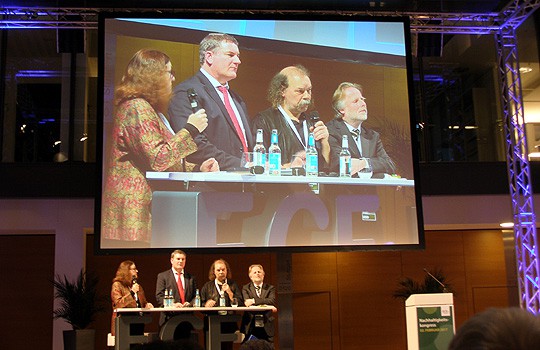Slowly but surely those in the German real estate industry – and possibly some day also those responsible for federal subsidy policy – seem to realise that, while not requiring a lot of energy, a well-insulated building still comes with its own difficulties: bad room air, elaborate ventilation solutions in order to avoid mildew and other related issues. At the ECE sustainability congress in Hamburg this was reflected in the central questions of the day: What will buildings as well as entire districts look like in the future and how will city planning be approached? During the day’s ultimate panel discussion Professor Kunibert Lennerts of the Karlsruhe Institute of Technology (KIT) captured the entire issue in a nutshell: he said he hoped that the house of the future would be so designed that its residents can simply open a window if they so desire. With surprising clarity most participants of the panel identified federal subsidy policies as the biggest stumbling block for the sensible and sustainable redevelopment of property.
The panel largely agreed that especially with regard to existing real estate not all buildings could be lumped together. At the same time individual solutions are difficult to realise because of the high degree of regulation in the building sector. Another problem is that federal subsidies are almost entirely spent on new construction although the greatest potential lies in the renovation of existing buildings. According to the panel the 2016 tightening of the German energy saving regulation (EnEV), which is aimed at new construction, achieves almost no CO2 savings while increasing the cost of new construction by eight per cent.
At least the German Property Federation (ZIA), the lobbying organisation for the German real estate sector, is already much further advanced. It argues that districts must be considered in their entirety. According to the ZIA it must be possible to find the most suitable kind of energy supply for each individual location, energy advice to tenants must be included and craftspeople must be trained for complex technical heating solutions. To my own delight, and entirely in agreement with the Cradle to Cradle concept, their ideas for district planning even include planting concepts and social spaces.
Bernd Schwarzfeld of BZE-Ökoplan contributed the most radical ideas: He called for a complete ban on newly installed heating systems for inner city renovation and conversion projects. Instead, he argued, creative solutions to cover their heating requirements must be found by looking for excess energy in the surrounding area. Whether such a concept would be feasible in every case may be questionable. However, it certainly is a goal that could initiate technical innovation beyond the existing mainstream concepts.
On the whole however, the panels and presentations yielded rather few contributions that strayed too far from the gospel of efficiency policy. Unfortunately part of the reason for this – and this could be heard time and again – is that topics like healthy room air, building materials or social aspects are seldom addressed by residential and commercial tenants or customers. However, investors and landlords should beware of passing the blame. If – as became clear during a number of conversations – a considerable portion of participants travel to a sustainability congress by plane from cities that offer perfectly good rail links, a lot remains to be done on one’s own doorstep.

 Monika Griefahn GmbH
Monika Griefahn GmbH
Leave a Reply